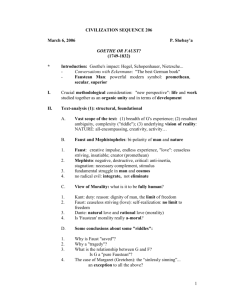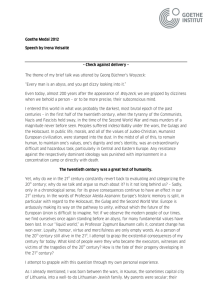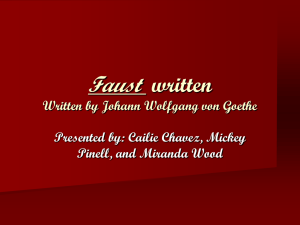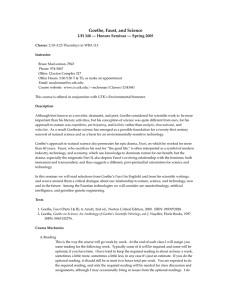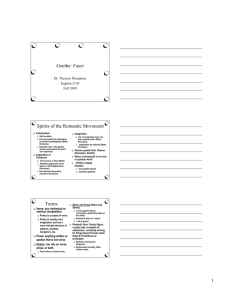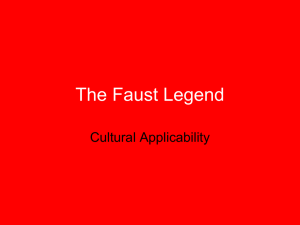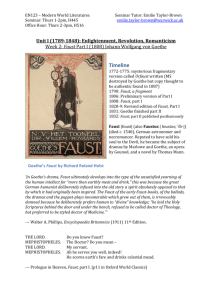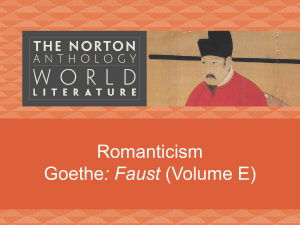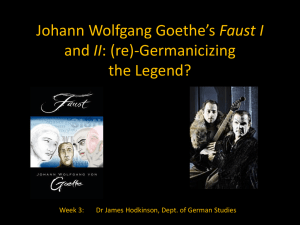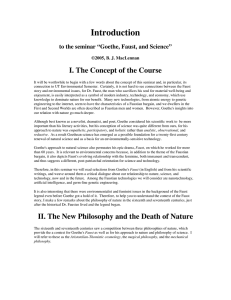Faust - Harrison Humanities
advertisement
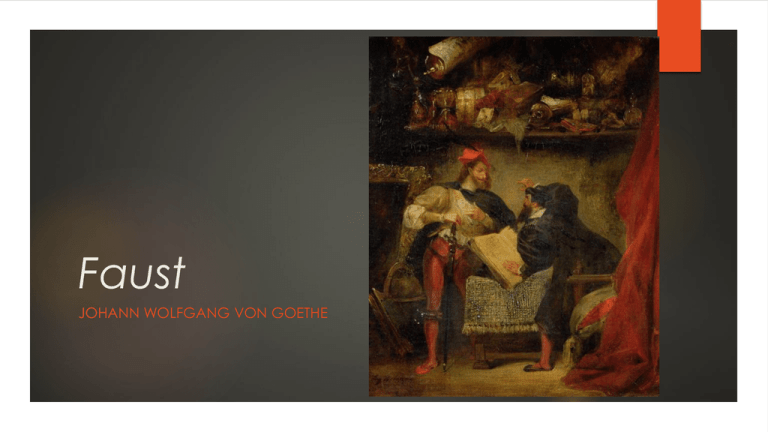
Faust JOHANN WOLFGANG VON GOETHE Background Goethe's play comes from popular legends that circulated throughout Europe from the sixteenth century onward. Scholars believe that a man named Faust -- probably a doctor or spiritualist -- did actually exist in sixteenth century Germany. He even receives a mention from Martin Luther, the father of the Protestant Reformation, as a "conjurer and necromancer" who dabbled in the devil's work. The real Faust probably dabbled in alchemy and made a living as a traveling magician, providing spectacle to audiences of medieval Europe. Background Goethe's Faust tells a grand and philosophical tale. Goethe wrote the play in order to explore the themes of philosophy, religion, politics, culture, and literature, as well as what these meant in the context of an enlightened age. In this story, Faust is not a magician but is, instead, an academic who has reached the limits of learning and knowledge. He seeks a fuller life and to know about nature and the universe. Through a wager with the Devil, he hopes to take advantage of a life beyond his study and see the answers that the universe might provide to him. Faust is, in the end, a tragedy. His realization that eternal love trumps a man’s subjective self cannot save him from his pact with the Devil. Faust, representing the modern human being, always drives himself to damnation, held back from the moment of true enlightenment. Faust and Romanticism In the intellectual history of Europe, Johann Wolfgang yon Goethe (1749-1832) is central to the development of Romantic thinking, which was contemporary in his day. Because Goethe attempts to see the world in a new light, he must reconsider old questions of good and evil, as well as questions about human nature. The story of Faust allows such considerations. Faust and Romanticism Romantics strive for something beyond their reach, beyond anyone's reach. Contentment is not their goal. Faust as a Romantic realizes the limitations of what's in books and is unwilling to accept those limitations. Romantic express a faith in Nature as a creative source of comfort and energy. Faust expresses his enthusiasm when he contrasts the value of experiencing nature with the deadness of books. Rather than seeking knowledge, Goethe's Faust seeks experience and feeling. This also makes his quest a part of the Romantic tradition. The Romantic hero must approach life's mysteries by active participation, not by reflection. Faust vs. Candide When you read Voltaire's Candide, you saw the hero finally attain some happiness at the end by cultivating his own garden. This does not make a very good metaphor for Romantic goals, though it may satisfy the Enlightenment figures who preceded Goethe. The Romantic wants the wildness of nature, not its controllable features. In your textbook… Read background information on p. 845 and p. 846. Read the Prologue in Heaven, a conversation among The Lord (God), Mephistopheles (the devil), and Raphael, Gabriel, and Michael (archangels) pp. 846850. Answer the Literary Analysis question in the margin of pages 847 & 848. In your textbook… Read the excerpt for Part I of Faust on pp. 851-862. Use quotes from the text to answer the Literary Analysis questions in the margins of pages 852, 854, 856, 860, & 861. Use quotes from the text to answer #1, 2, & 3 p. 863. Don’t forget lead-ins!
